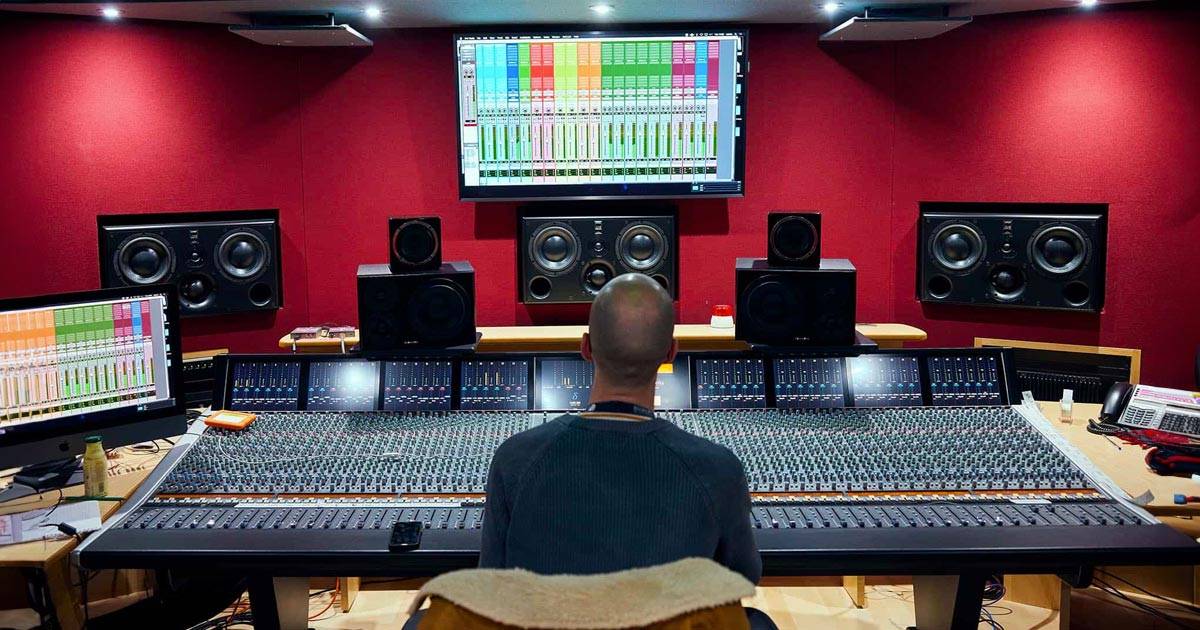Is Audio Engineering a Good Career? How to Become an Audio Engineer: Pros of a Career in Audio Engineering
![]()
Becoming an audio engineer requires a combination of education, experience, and skill development. Here are the steps aspiring students can follow to pursue a career in audio engineering:
Gain a solid foundation in music and sound: Aspiring audio engineers looking to enhance their skills and knowledge in the field should consider enrolling in audio engineering courses that cover a range of topics. These courses can provide a comprehensive foundation for aspiring audio engineers, covering essential areas such as music theory, acoustics, physics of sound, musical instruments, recording equipment, and software.
Pursue formal education: Consider enrolling in a reputable audio engineering degree program to enhance your skills and job prospects as an audio engineer. Pursuing a formal education in music production, recording arts, or audio engineering can provide you with the knowledge and practical training necessary to succeed in this field.
Learn industry-standard software and equipment: Audio engineers use software and equipment like DAWs, mixing consoles, microphones, and processors. Familiarize yourself with industry-standard software like Pro Tools, Logic Pro, Ableton Live, and other common tools.
Gain hands-on experience: Gain practical experience as an audio engineer through internships, personal projects, collaborations, and assisting in audio-related environments like recording studios or live sound venues.
Develop your listening skills: Develop a keen ear for sound by practicing critical listening to various music and audio recordings. Learn to identify and correct imperfections like noise, distortion, and frequency imbalances.
Build a portfolio: Build a portfolio of your recording, mixing, and mastering projects as you gain experience to showcase your abilities to potential employers or clients.
Continuously improve your skills: Continuously improve your audio engineering skills by experimenting with recording techniques, staying updated with latest technologies, seeking feedback from peers/mentors, and embracing lifelong learning.
Seek job opportunities and freelance work: Apply for job opportunities or freelance work in audio-related industries such as recording studios, live sound venues, or broadcast facilities. Be proactive in seeking internships, entry-level positions, or gigs to gain practical experience and advance your career as an audio engineer.
Pros of a Career in Audio Engineering
A career in audio engineering can offer many advantages and opportunities for individuals who are passionate about music, sound, and technology. Some of the pros of a career in audio engineering include:
Creative Outlet: Audio engineering is a creative outlet where you work with sound and music. You can shape audio, mix music, design sound effects, and create immersive experiences.
Diverse Career Opportunities: Audio engineering offers diverse career opportunities in recording studios, live sound production, film, video games, and more. You can specialize in areas that interest you.
Technical Expertise: Audio engineering requires technical skills in equipment, software, recording, editing, mixing, and mastering. Developing these skills leads to a specialized and in-demand skill set.
Collaboration: Audio engineers collaborate with musicians, producers, and other professionals, fostering teamwork and creativity. It’s a dynamic and engaging career working with diverse talent.
Job Satisfaction: Audio engineering is deeply satisfying for music and sound enthusiasts. You can contribute to audio content creation and see your work come to life, which is highly rewarding.
Flexibility: Audio engineering careers offer work flexibility as a freelancer, studio owner, or for a company. You can set your own schedule and work on projects that align with your goals.
Continuous Learning: Audio engineering is constantly evolving with new technologies and trends. This offers continuous learning and growth opportunities to stay updated in the industry.
Potential for Financial Reward: Experienced audio engineers can earn a competitive salary, especially with specialized skills, high-profile projects, and commercial success.
Final Thoughts
A career in audio engineering can offer great rewards and fulfillment for individuals who have a genuine passion for music and sound. To become an audio engineer, one needs to possess a well-rounded combination of technical knowledge, artistic skill, and practical experience. Keeping abreast of the latest advancements in technology and industry trends is crucial, as is establishing a robust network of professional contacts. Enrolling in a reputable institute such as AudioLife can provide valuable education and training. With persistent hard work, unwavering dedication, and a commitment to excellence, aspiring audio engineers can pave the way to success and make a meaningful impact in the dynamic world of music and entertainment.
10 Career Paths Available with an Audio Engineering Degree

Wondering what type of job might require a degree in audio engineering? Look no further! In this article, we’ll look at the different careers available in the dynamic field of audio engineering. From music production to live sound engineering, there’s a wide range of opportunities awaiting those with a passion for sound and technology.
Why pursue a degree in audio engineering?
Pursuing a degree in audio engineering is an enticing prospect for several reasons. For starters, it enables individuals to turn their passion for music and sound into a lucrative job. Exploring the endless possibilities of sound production is made possible by obtaining a degree in audio engineering.
Secondly, obtaining a degree in audio engineering provides students with specialized knowledge and hands-on experience using cutting-edge technology. Students gain practical skills in mastering mixing consoles and recording software, giving them a competitive edge in the job market.
Furthermore, a degree in audio engineering teaches individuals key transferable skills such as communication, problem-solving, and collaboration. Audio engineering graduates are well-equipped for the professional world as they have developed strong communication, critical thinking, and collaboration skills during their studies.
Overall, pursuing a degree in audio engineering offers a unique blend of creativity, technical expertise, and practical skills that can lead to a fulfilling and successful career in the field of sound and music production.
What are the issues with this degree?
Audio engineering degrees offer great benefits, but students may face challenges. The industry is highly competitive, making it hard to find entry-level jobs. Networking, being proactive, and honing skills are important to stand out from the competition.
Furthermore, audio engineers face ongoing challenges due to the rapid speed of technological advancement. As new software, hardware, and procedures emerge, professionals in the area must keep up with the latest innovations to be relevant and competitive. This ongoing learning process requires dedication, time, and resources, as professionals may need to invest in additional training or certifications to stay ahead of the curve.
Despite these challenges, a degree in audio engineering can be incredibly rewarding for those who are passionate about sound and music. By recognizing and addressing these potential issues early on, students can better prepare themselves for success in this dynamic and ever-evolving field.
10 Jobs you can get with an audio engineering degree
1. Sound Engineer
Sound engineers play an important part in the entertainment industry, recording, mixing, and mastering audio for a variety of projects, including music albums, films, television shows, and live events. They collaborate closely with artists, producers, and directors to obtain the desired audio quality and effects. Sound engineers often earn between $45,000 and $100,000 per year, based on their experience and the scope of the projects they work on.
2. Audio Technician
Audio technicians are experts in putting up and maintaining audio equipment for live events such as concerts, conferences, theatrical shows, and sports games. They guarantee that sound systems work properly and give technical support during performances. The salary for audio technicians ranges from $35,000 to $70,000 per year, with opportunities for growth as they gain experience in the field.
3. Music Producer
Music producers oversee the entire process of music production, from songwriting and arranging to recording and mixing. They collaborate closely with artists to shape their sound and vision, guiding them through the creative process and ensuring that the result fulfills industry standards. Music producers can earn $50,000 to $120,000 per year, with the potential for higher incomes depending on the success of their work.
4. Acoustical Engineer
Acoustical engineers create and optimize acoustic settings for a wide range of applications, including concert halls, recording studios, and public areas. They employ their knowledge of acoustics and architectural design to build environments that improve sound quality and reduce unwanted noise. Acoustical engineers’ annual wages range from $60,000 to $110,000, depending on their level of expertise and the intricacy of the projects they work on.
5. Foley Artist
Foley artists create sound effects for films and television, utilizing a variety of objects and techniques. They apply their creativity and technical expertise to reproduce real-world sounds and improve the overall audio experience of a production. Foley artists can make anywhere from $40,000 to $80,000 per year, depending on their degree of experience and demand for their services.
6. Broadcast Engineer
Broadcast engineers install and maintain audio and video equipment for radio and television broadcasts. They ensure that broadcasts are delivered with high-quality sound and pictures, troubleshooting any technical issues that arise during live broadcasts. Broadcast engineers typically earn salaries ranging from $50,000 to $90,000 per year, with opportunities for advancement in larger broadcasting companies.
7. Audio Software Developer
Audio software developers create and program applications for music production, video production, and live sound reinforcement. They employ their knowledge of audio engineering concepts and programming skills to develop user-friendly and efficient software solutions. Audio software developers might earn between $70,000 and $130,000 per year, depending on their level of experience and the profitability of their products on the market.
8. Audio Restoration Engineer
Audio restoration professionals specialize in cleaning and improving damaged or degraded audio recordings. They employ specialized software and procedures to eliminate background noise, clicks, and pops while improving overall sound quality. Audio restoration engineers typically earn salaries ranging from $40,000 to $80,000 per year, depending on their experience and the complexity of the restoration projects they undertake.
9. Audio System Designer
Audio system designers create complicated audio systems for large-scale events and installations like concerts, festivals, and theme parks. They work closely with clients to understand their audio needs and preferences, and then design customized systems that deliver optimal sound quality and coverage. Audio system designers might earn $60,000 to $110,000 per year, depending on the scale and breadth of the projects they work on.
10. Live Sound Engineer
Live sound engineers are in charge of producing high-quality sound during live events in a variety of settings, including music halls, theaters, and outdoor stadiums. They operate sound equipment, mix audio signals, and monitor sound levels to ensure that performers sound their best. Live sound engineers typically earn salaries ranging from $50,000 to $100,000 per year, with opportunities for additional income through freelance work and overtime.
Are there non-music jobs available for audio engineers?
Yes, there are several non-music-related jobs available for audio engineers. For example, audio engineers can work in the film and television industry, where they are responsible for recording dialogue, creating sound effects, and mixing audio tracks for movies, TV shows, and commercials. They might also work in the gaming industry, creating and integrating audio effects and music for video games.
Audio engineers can work in various industries, not just music and entertainment. They can use their audio technology expertise in fields like telecommunications, automotive engineering, and healthcare. An audio engineering degree can pave the way for diverse career opportunities.
Audio engineering is an awesome career path
Passionate about music, sound, and technology? Pursue a rewarding career in audio engineering. With an audio engineering degree, you can succeed in a recording studio or at live events. With dedication, creativity, and perseverance, the possibilities are endless with audio engineering.
https://brainwavetrail.com/10-jobs-you-can-get-with-an-audio-engineering-degree/
